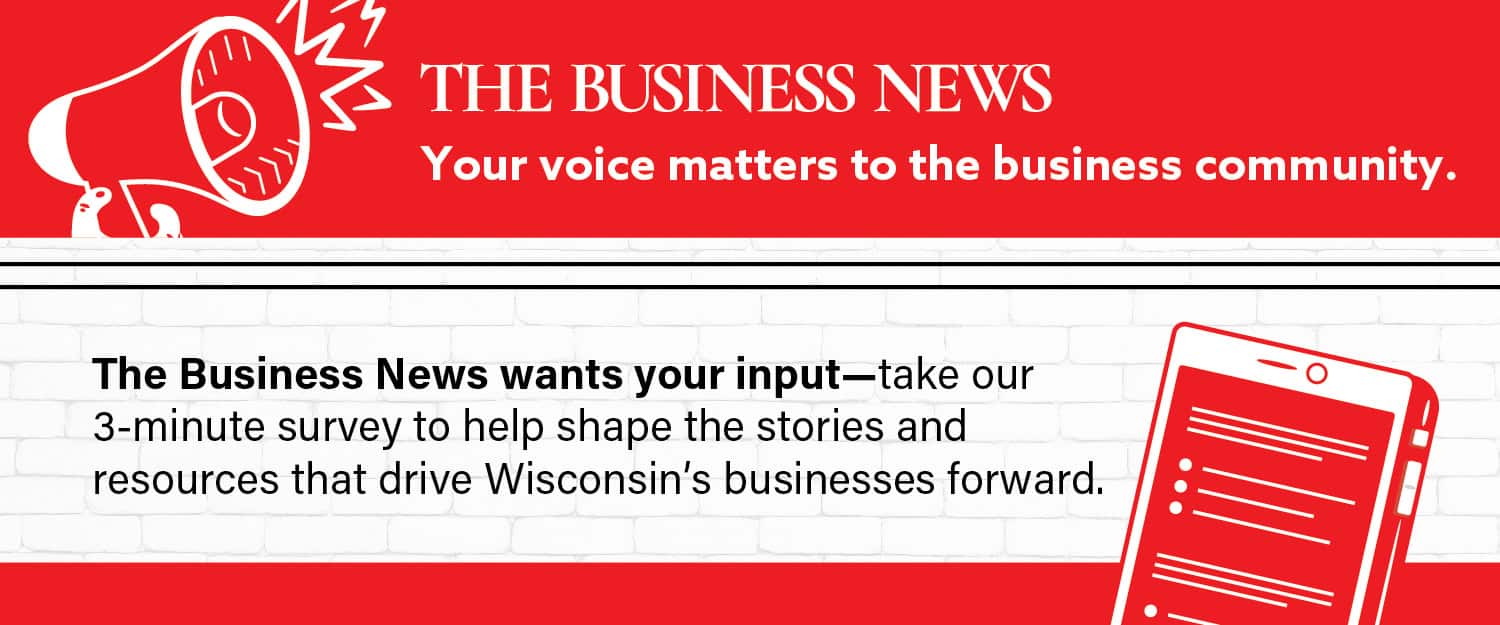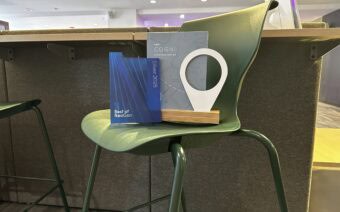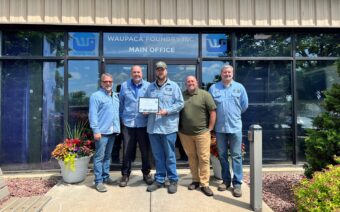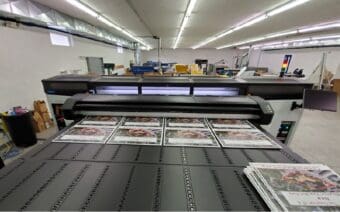
January 27, 2023
NORTHEAST WISCONSIN – Looking back over the last 30 years, Todd Pagel, vice president of operations at Waupaca Foundry, said he expected his life to take a much different path than it did.
“I grew up in a small town, and I worked on a farm in our community,” he said. “When I graduated high school, I went to college for a year and a half, and with my background in 4H and working on a big beef cattle operation, I was going to school to be a veterinarian.”
Pagel said after realizing college wasn’t for him, he returned home and went back to work on the community farm.
“After about eight months of being back, I felt guilty about not finishing school,” he said. “I thought, ‘well, if I’m going to go back to school, I need to be able to support myself.’”
Pagel said a friend of his worked at Waupaca Foundry, and before he knew it, one thing led to another, and he started working at the foundry.
“He showed me his paycheck and I said, ‘Holy cow, that’s a big difference than working at a farm,’” he said. “So, I put an application in with Waupaca Foundry and got hired.”
Pagel said his intention was to work at the foundry for a year to a year and a half, save some money and then return to school.
“Well, in that year and a half, life happened – I met my wife, we got engaged and then bought a house,” he said. “A year later, our daughter was born and the next thing you know, you’re saying, ‘hey, there’s lots of opportunity at Waupaca Foundry – there’s no reason why I can’t make a career here.”
Pagel said that was 30 years ago.

Todd Pagel
Over the last three decades, Pagel has worked his way up the ladder thanks in part to the opportunities he said the foundry has provided him.
“I started as a general laborer in what we call our molding department,” he said. “I was in the molding department as an operator for a couple of years. I then took a quality role. Then I was asked to come back to the molding department as a team leader. Then from team leader I became a foreman, then an assistant production manager, production manager, then assistant plant manager, plant manager, director of operations and now vice president of operations.”
Pagel said it’s been 30 years of one opportunity leading into the next.
However, he said his story is not unique.
“We could line up 100 people or more who could tell a similar story to mine,” he said. “The foundry is like a family.”
In hindsight, Pagel said he has no regrets about where life led him.
“Waupaca Foundry has been an amazing opportunity for me and my family,” he said. “Everything Waupaca Foundry has given me, I feel like I’m responsible for giving back. We have a lot of our employees who feel that same way, and that goes back to that family atmosphere and culture of promoting from within.”
Committed to its employees
Rob Johnson, executive vice president of administration and CFO of Waupaca Foundry, said though his tenure with the company doesn’t extend as long as Pagel’s, his experience with the foundry’s family-like atmosphere runs deep.
“My father worked for the company for 35 years, so I’ve been around Waupaca Foundry for my whole life,” he said. “I did work in the mill room for summer college help. I also worked in accounts receivable for a summer.”

A Waupaca Foundry employee inspects iron castings as they make their way through the mill room. Submitted Photo
Johnson said one of the consistent strengths of Waupaca Foundry – which got its start in 1971 as Pioneer Foundry – has been its employees.
“I think one of the things I’ve learned, and part of this has probably been from my father working here for 35 years, is the money is made on the floor,” he said. “I think sometimes executives get to a level and think they’re taking all the shots and doing all these important things, but when it comes down to it, the money is made on the floor.”
Johnson said understanding that concept is important.
“When you have a culture that you’re promoting within, I think everyone shares that same value,” he said.
Johnson said internal candidates fill 80% of all management positions at Waupaca Foundry.
“When you look at the years of success we’ve had, it doesn’t come without great people and great leadership,” he said. “It’s kind of cliche, but I think Waupaca Foundry is a great example of practicing what we preach and promoting within. It has been extremely critical, and quite frankly, has been a competitive advantage for us.”
Pagel said those “proof is in the pudding” examples are seen firsthand by foundry employees.
“With all of the promote from within we do, (employees) can see that reinforced several times throughout the year,” he said. “They feel confident that their efforts will be rewarded through advancement. I feel our workforce sees that, they see the opportunity and it certainly provides motivation to give us their best.”
Today, the foundry employs approximately 4,000 people and has grown to be North America’s leading supplier of iron castings to the automotive, commercial vehicle, agriculture, construction and industrial markets.
The company has seven iron foundries located in Waupaca, Marinette, Tell City, Indiana, Etowah, Tennessee and Lawrenceville, Pennsylvania – with 1.4 million tons of capacity.

A Waupaca Foundry employee processes iron castings for shipment. The foundry is the leading supplier of iron casting worldwide. Submitted Photo
It also has machining and assembly finishing operations in Waupaca and Effingham, Illinois.
Sara Timm, director of marketing at Waupaca Foundry, said it sometimes surprises people that the foundry is the world’s largest supplier of iron casting because it isn’t a consumer-facing brand.
“We’re a tier-two supplier,” she said. “You can come here and work for the world leader on your back doorstep. You can bring your best to the organization and make a difference day in and day out. In that process of making a difference and giving your best, it makes you uniquely positioned to take on advancing roles. I think that’s key.”
Johnson said the foundry has opportunities available from entry-level up to executive-level administration and everything in between.
“People who want to work hard and advance themselves, there are tremendous opportunities,” he said. “There’s a lot of different variations of what people’s desires are in life, and I think we can fulfill any need they want. Not everyone’s need and desire is to become an executive. Not everyone desires to become a manager, but there’s always an opportunity for people who work for Waupaca Foundry to have those opportunities.”
Johnson said though the foundry is fully committed to investing in its current workforce, they also welcome new employees.
“We’ve talked a lot about promoting within, and I think that’s a great opportunity, but it also doesn’t mean we’re excluding people coming from outside Waupaca Foundry that want to be a part of it,” he said. “We’ve hired some great talent from outside the foundry who wanted to get their foot in the door. After they get their foot in the door, they realize what a great company we are… I think that blend is important.”
Part of that effort, Johnson said, includes partnering with area schools.
“We’re bringing more and more high schools into our facilities,” he said. “Sometimes, the stereotype of a foundry is dirty, but when teachers and students come in, I think it’s eye-opening for them to realize how different that is. We’ve got a great mentorship program here at Waupaca Foundry. We’ve got internships with college students. So, we’ve got a lot of opportunities at the company for pretty much anyone that is willing to give it a try.”
Building expertise
Pagel said by moving his way up the ranks as he did, he has a wider perspective of foundry operations now in his new position.
“The things we do are processes on top of processes on top of processes,” he said. “We have the melting process. We have the core-making process. We have the molding process. We have the iron-pouring process, the shake-out process and the mill room process.”
Pagel said those are just the production-side processes.
“(That doesn’t include) all the admin processes that support the operation,” he said. “Through my career at Waupaca Foundry, I gained more and more exposure to all those manufacturing processes, and that helps with the experiential knowledge. There is a lot of stuff we do that even though you may have a background in, or you may have come to us as an engineer or have other educational backgrounds – there’s still stuff you have to learn by doing our process and by learning the Waupaca way, as we call it.”
As he’s climbed the workforce ladder, Pagel said whatever frustrated him in a certain role, when he became a leader in that area, he tried to rectify those frustrations so others wouldn’t experience the same frustrations he did.
“I’ve had the fortunate opportunity to look at both sides of the fence all the way up to my vice president of operations role,” he said. “I think it’s given me a good perspective to understand what causes challenges and roadblocks for people, and then be able to give them my experiential knowledge of how we overcome those.”

Rob Johnson
Pagel said his experiential knowledge has given him credibility in his new role.
“When you can say, ‘I used to run this molding machine, this is what frustrates me. What’s frustrating you?’” he said. “You can have that bond because you’ve done it before and you can speak the language. Those are the ways I have applied that knowledge coming up through the ranks to support the various different departments or plants (that I am now leading).”
Pagel said his experiential knowledge also helps with his interactions with clients.
“In many different conversations (I’ve had with customers) when I tell them, ‘I’m Todd Pagel. I am from Waupaca Foundry. I have 30 years in at the foundry’ – you can automatically see a comfort level come over to them,” he said. “You can see them be comforted by seeing that this guy or gal knows their business. They are comforted by the fact that there are so many people at Waupaca Foundry that have that level of tenure and that level of experience from the shop floor up into the intricacies of what we do.”
Small-town USA
Johnson said being located in Waupaca – a Northeast Wisconsin city of just more than 6,000 people – the foundry has a different dynamic than other companies of similar size.
“Our plants are in smaller locations, where the cities aren’t big,” he said. “I would say several large companies our size don’t have that same atmosphere.”
Johnson said the foundry does everything it can to be a “good social community member.”
“With our collaboration we’re trying to do with the school district and working with the city on different projects – I want everyone to understand we’re a great place for a long-term career, no matter what you’re willing to do,” he said.
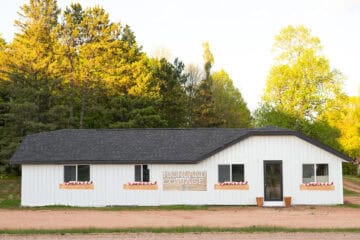 Lifelong dream becomes reality for local woman and husband
Lifelong dream becomes reality for local woman and husband Lacing up a legacy: Premium boot company stays true to American workers, history
Lacing up a legacy: Premium boot company stays true to American workers, history

